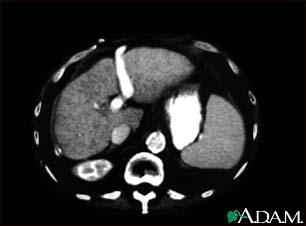Symptoms & Signs
Alcohol affects the central nervous system as a depressant. This leads to a decrease in:
* Activity
* Anxiety
* Inhibitions
* Tension
Even a few drinks can change behavior, slow motor skills, and decrease the ability to think clearly. Alcohol can impair concentration and judgment. Drinking a lot of alcohol can cause drunkenness (intoxication).
Some of the symptoms of alcoholism include:
* Abdominal pain
* Confusion
* Drinking alone
* Episodes of violence with drinking
* Hostility when confronted about drinking
* Lack of control over drinking — being unable to stop or reduce alcohol intake
* Making excuses to drink
* Nausea and vomiting
* Need for daily or regular alcohol use to function
* Neglecting to eat
* Not caring for physical appearance
* Numbness and tingling
* Secretive behavior to hide alcohol use
* Shaking in the morning

Alcohol withdrawal develops because the brain adapts to the alcohol and cannot function well without the drug. Symptoms of withdrawal may include:
* Anxiety
* Confusion or seeing and hearing things that aren’t there (hallucinations)
* Death (rarely)
* Increased blood pressure
* Loss of appetite, nausea, or vomiting
* Psychosis
* Raised temperature
* Rapid heart rate
* Restlessness or nervousness
* Seizures
* Tremors
Diagnosis & Tests
Those at risk for developing alcoholism include:
* Men who have 15 or more drinks a week
* Women who have 12 or more drinks a week
* Anyone who has 5 or more drinks per occasion at least once a week
(One drink is defined as a 12-ounce bottle of beer, a 5-ounce glass of wine, or a 1 1/2-ounce shot of liquor.)
All doctors should ask their patients about their drinking. The health care provider can get a history from the family if the affected person is unwilling or unable to answer questions. A physical examination is done to identify physical problems related to alcohol use.
The following questions are used by the National Institute on Alcohol Abuse and Alcoholism to screen for alcohol abuse or dependence:
* Do you ever drive when you have been drinking?
* Do you have to drink more than before to get drunk or feel the desired effect?
* Have you felt that you should cut down on your drinking?
* Have you ever had any blackouts after drinking?
* Have you ever missed work or lost a job because of drinking?
* Is someone in your family worried about your drinking?
Tests for alcohol abuse include:
* A toxicology screen or blood alcohol level (this can tell whether someone has recently been drinking alcohol, but it does not necessarily confirm alcoholism)
* Complete blood count (CBC)
* Folate tests
* Liver function tests
* Serum magnesium
* Total protein
* Uric acid
Alcoholism: Overview, Causes
Alcoholism: Symptoms & Signs, Diagnosis & Tests
Alcoholism: Treatment
Reviewed By : George F. Longstreth, MD, Department of Gastroenterology, Kaiser Permanente Medical Care Program, San Diego, California. Also reviewed by David Zieve, MD, MHA, Medical Director, A.D.A.M., Inc.
